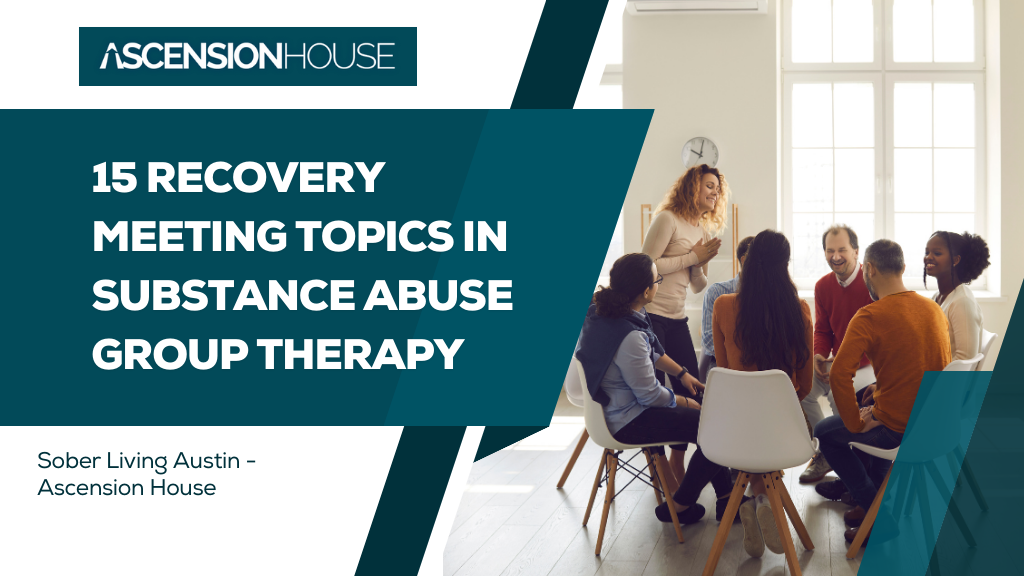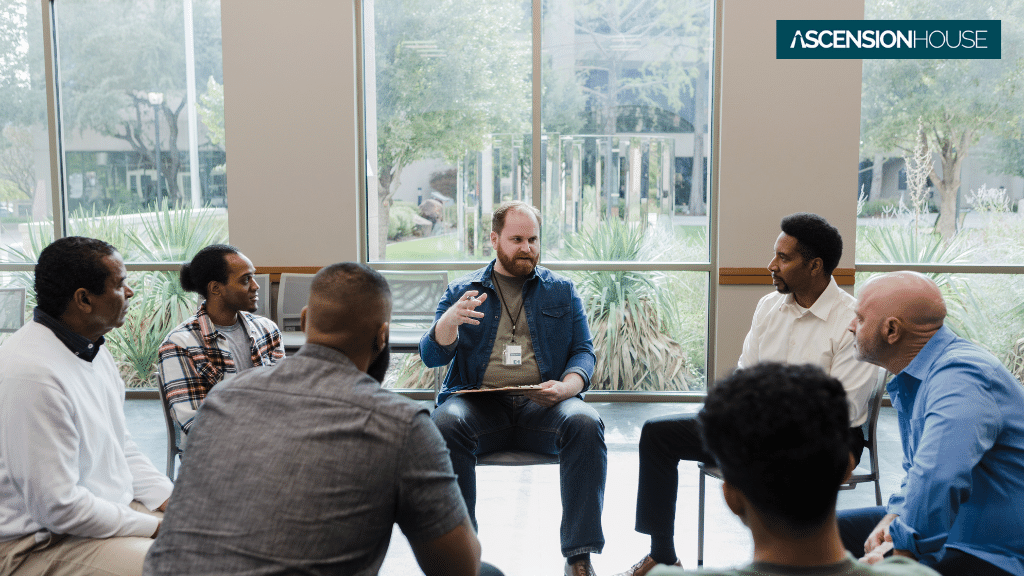
Group therapy is crucial for early recovery and beyond, and it offers many benefits. The sessions are led by therapists who start the treatment by guiding the discussion and encouraging everyone to participate.
There are various types of therapy groups, including:
- Skills Development – This helps clients learn the basic skills to maintain sobriety.
- Psychoeducational – This teaches clients about substance abuse and addiction.
- Process – This helps people recreate their pasts in the group to rethink the life problems they’ve escaped by using substances.
- Support – These empower people to hold themselves and others accountable to focus on change.
- Cognitive Behavioral Groups – These help clients change their negative mindsets, behaviors, and thoughts, which contribute to the addiction.
Whether you focus on the World Services aspect or something else, having various topic suggestions is important. You’ll do your group a service by being prepared and ready.
Explore 15 essential substance abuse group therapy meeting topics.https://t.co/q5LU9R4ko1 pic.twitter.com/ddcqZMuc1x
— Ascension House – Sober Living Austin (@AscensionSober) October 16, 2023
Common Meeting Topics for IOP Substance Abuse Treatment Therapy
Whether you choose to lead a group in online meetings or in-person ones, you need a long list of topic suggestions to keep the conversations going. Here are 15 to consider:
Substance Abuse Triggers
A trigger is what makes you want to use alcohol or drugs again. Triggers are very dangerous because they increase the risk of relapse.
Typically, therapy groups will allow people to talk about their triggers. Each member will discuss them, which might help everyone identify their patterns. Likewise, therapy will help everyone focus on how they respond to the triggers and how they can overcome them in the future.
Bad Habits
Substance abuse treatment focuses on learning how to replace those bad habits with better ones. When you change your daily routines, you’ll create a healthier life for yourself. However, group members might require help identifying them before you can teach them how to develop new ones for sobriety.
Negative Thinking
Negative thoughts can influence your behavior and mindset. In therapy, you will discuss this with others and explore why you think negatively, its impact on your relationship with yourself, and how you could change.
Forgiveness
Recovery focuses on letting go. However, that’s hard for many people. During therapy sessions, you will discuss forgiveness and overcome your resentments. Likewise, you might ask your Higher Power to forgive you for wrongdoing.
For instance, you’ve been holding a grudge against someone. You’ll talk about how that has affected your life and discuss the importance of forgiveness and how to do it.
Mindfulness
Mindfulness is a person’s ability to be aware of where they are and what they’re doing while remaining present. They don’t become overwhelmed by their surroundings. It seems abstract, but it has benefits to discussing and practicing that topic.
You might focus on the things you can’t change in your life or talk about the benefits it offers and how it will help you maintain sobriety.
Overall, this practice is part of the principles of the 12-step program and can go hand-in-hand with spiritual awakening.
Gratitude
What’s gratitude? How do you express or feel it? What people or things in your life are you most grateful for? Why? You will discuss all of these things in group therapy. By doing so, you’ll have a more positive outlook and attitude!

Trauma
Traumatic experiences can include physical injury, extreme loss, and physical abuse. They will have lasting impacts on your behaviors, thoughts, and life. Discussing the trauma during group therapy will help you address your situation more healthily and learn how to cope.
Plus, you’ll tell your story and listen while others share theirs. This will help you build a strong bond and restore your trust in people. You’ll often look to your Higher Power, forgive it/them for the trauma you experienced, and learn how to move on without isolation or alienation.
Alternative Sober Activities
It can be hard to imagine life without alcohol or drugs. In group therapy, you will focus on alternative activities to engage with others and have fun without those substances.
Some people might want to join the World Services movement to help others deal with addiction and sobriety. Regardless, you can build up your relationships and establish new ones.
Empathy
Developing empathy is something many people don’t understand. However, you can practice this with role-playing activities. You’ll learn to be sensitive to what others feel, which will bring in healthier relationships with everyone you care about.
A therapy service will help you achieve your goals.
Stress/Anger Management
Anger and stress can lead to a relapse if you aren’t careful. Therapy will challenge you to answer questions about why you’re angry/stressed and what happens if you can’t control it.
When discussing these issues, you’ll develop healthier methods for controlling anger and stress. Therefore, you will serve yourself and build a stronger relationship with yourself.
Self-Exploration
With group therapy, you’ll explore yourself by describing your interests, flaws, and goals. This often leads to a spiritual awakening in people. When you identify those things, you can understand your thoughts and behavioral patterns well and work on being the person you want to be!
Future Plans
It’s helpful to talk about the past, but group therapy will also focus on the future. You’ll use various World Services ideations and get motivated to become and stay sober. Plus, you can build new relationships, attend school, make amends, and more.
Self-Care
Self-care isn’t a priority when addicted to something, but it’s crucial for recovery. You’ll learn what others do to maintain their physical and mental health. For example, you could talk about strategies for maintaining healthy routines.

Positivity and Optimism
It’s crucial to have a positive outlook in recovery. You’ll make amends, talk to your Higher Power, and might even have a spiritual awakening.
Using the “glass half full” thought process, you’ll focus on the positive things in your life. Even when negative issues arise, you’ll find the good in them and can move forward, dealing with them safely and healthily.
Overcoming Shame and Guilt
How did you deal with the guilt and shame you felt during addiction? You’ll focus on these things and understand that those character defects make you who you are. Though you cannot change them, you can gain peace and strength through your Higher Power to help you deal with them effectively.
Are Substance/Alcohol Abuse Support Groups Effective?
Group therapy is effective for addiction recovery. You’ll do yourself a service because you can improve your communication skills, gain self-awareness, reduce loneliness, and get honest feedback.

Get Help from Ascension House
These meeting topic suggestions will help those going through recovery. Whether it’s an individual therapy service or something else, talking things out is crucial.
Ascension House is a recovery home for those in Austin, TX. Please call 512-598-5030 to learn more!
FAQs
Countless meeting topic suggestions are listed above to help you focus the group on recovery based on the principles they need to thrive. Most therapists start with triggers and bad habits because those are the first things people must consider.
While the meeting topics in this article focus more on bringing people into their addictions and helping them move forward, you will want to have some fun questions available. These can include:
-If you could go anywhere in the world, where would it be and why?
-If you could change something about your life, what might it be?
-What’s happening now in your life that’s better since you stopped taking drugs/alcohol?
-What is one thing about yourself you want the group to know?
There are five principles to recovery, which should be done each day.
The principles are:
-Self-Care
-Prayer and meditation
-Accountability
-Giving of yourself
-Being grateful
Using the five principles of recovery, you can get into the deep questions addicts must answer for themselves. Here are a few to ask in sessions:
-What’s hard or challenging in your life right now?
-When did you begin using drugs or alcohol? Why?
-What do you like most about your substance of choice?
-Where are you now in your battle for sobriety?
Book a Free Assessment
Contact us to schedule a free addiction or mental health assessment as part of our admissions process.
 11700 Bittern Hollow Dr., Austin TX 78758
11700 Bittern Hollow Dr., Austin TX 78758 (512) 598-5030
(512) 598-5030






